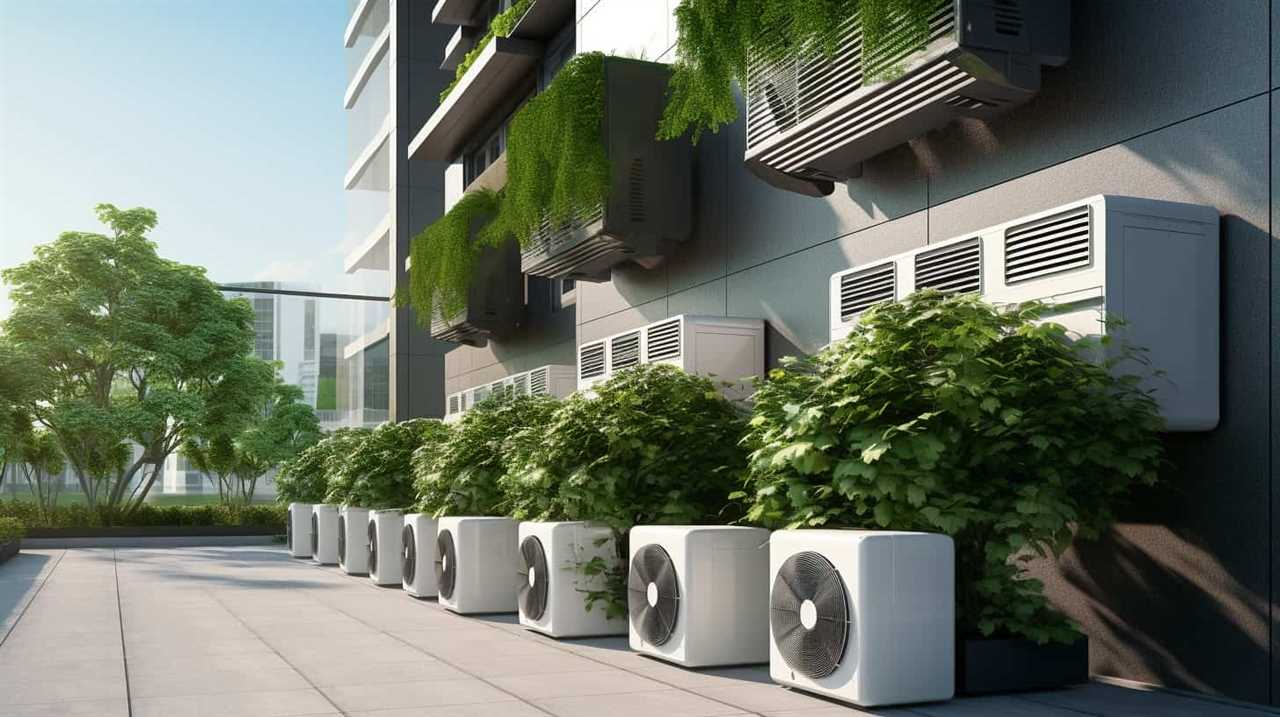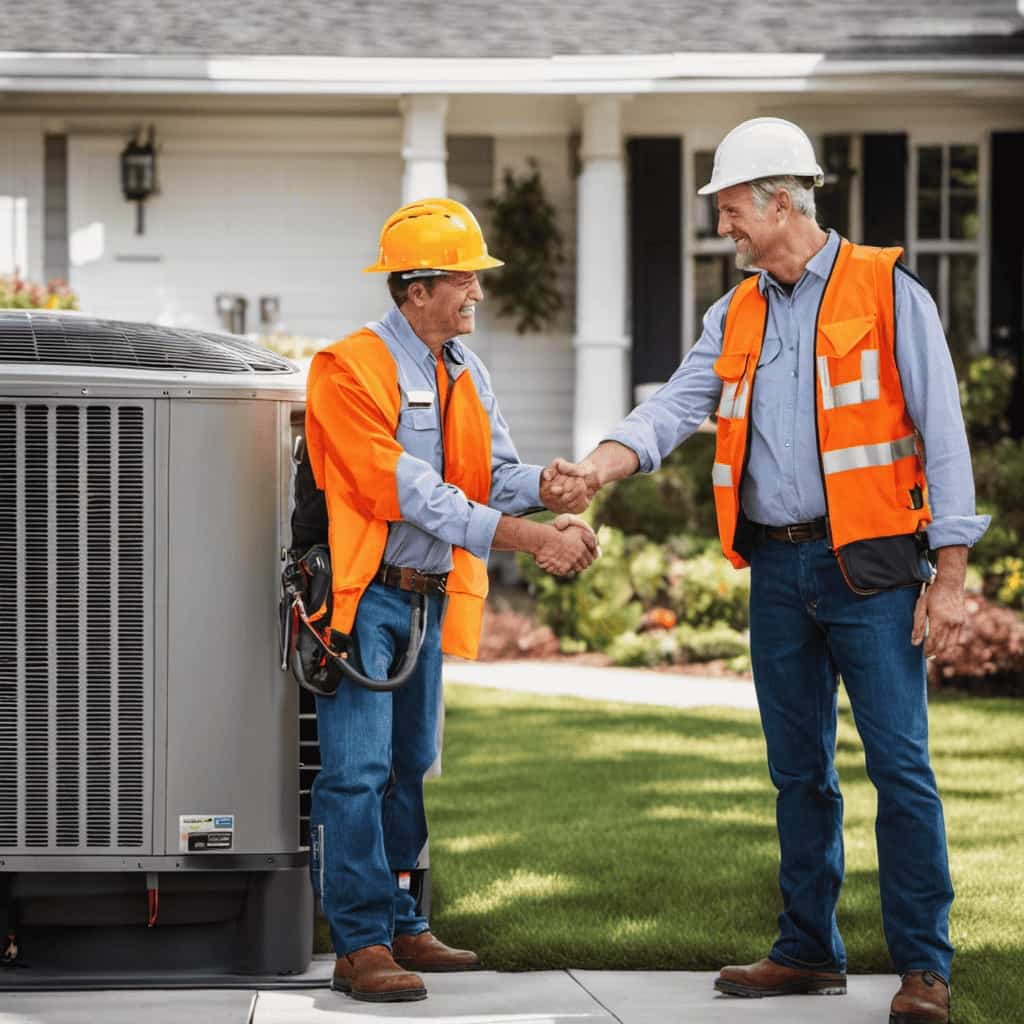
We can’t emphasize enough how embracing heat pump efficiency can revolutionize your electricity savings. With this game-changing technology, we can maximize our energy efficiency and enjoy substantial financial benefits.
In this article, we will delve into the basics of heat pump energy efficiency, understand its impact on electricity usage, and provide tips for optimizing energy savings.
Together, let’s explore how to choose the right heat pump and take control of our electricity bills for good.
Key Takeaways
- Regular maintenance, including cleaning or replacing filters and inspecting coils, maximizes heat pump efficiency.
- Proper insulation and sealing of the home enhance energy efficiency when using a heat pump.
- Understanding the coefficient of performance (COP) helps optimize energy usage and achieve greater savings with a heat pump.
- Investing in a highly efficient heat pump reduces energy consumption and lowers electricity bills, providing significant financial benefits.
The Basics of Heat Pump Energy Efficiency
We’ll explore the basics of heat pump energy efficiency. Heat pumps are a popular choice for energy efficient home heating. To ensure maximum efficiency, regular heat pump maintenance is essential. This includes cleaning or replacing air filters, checking and cleaning coils, and inspecting the refrigerant levels.
By keeping the heat pump well-maintained, it can operate at its peak performance, saving energy and reducing utility bills. Additionally, proper insulation and sealing of the home can further enhance energy efficiency. By minimizing air leaks and ensuring insulation is adequate, the heat pump doesn’t have to work as hard to maintain desired temperatures. This results in lower energy consumption and increased savings.
Understanding the basics of heat pump maintenance and implementing energy efficient practices can contribute to a more comfortable and cost-effective home heating experience.
Understanding the Impact of Heat Pump Efficiency on Electricity Usage
Our understanding of heat pump efficiency directly affects our electricity usage. Heat pump technology is designed to transfer heat from one area to another, either to heat or cool a space. The efficiency of a heat pump is measured by its coefficient of performance (COP), which is the ratio of heat output to the electricity input.
A higher COP indicates a more efficient heat pump. By investing in a highly efficient heat pump, we can reduce our energy consumption and lower our electricity bills. A more efficient heat pump requires less electricity to produce the same amount of heating or cooling compared to a less efficient one.

Understanding heat pump efficiency is crucial in making informed decisions to optimize our energy usage and achieve greater energy savings.
Tips for Maximizing Energy Savings With Heat Pump Efficiency
Let’s explore practical ways to maximize energy savings with heat pump efficiency. Here are three tips to help you achieve this:
-
Optimize temperature settings: Set your heat pump to the most efficient temperature for each season. For cooling, aim for around 78 degrees Fahrenheit and for heating, aim for around 68 degrees Fahrenheit. This will ensure optimal performance while reducing energy consumption.
-
Use programmable thermostats: Take advantage of programmable thermostats to schedule temperature adjustments based on your daily routine. By adjusting the temperature when you’re away or asleep, you can further maximize energy savings without sacrificing comfort.

-
Regular maintenance: Keep your heat pump in top condition by scheduling regular maintenance checks. This includes cleaning or replacing filters, inspecting coils, and ensuring proper refrigerant levels. By maintaining your heat pump, you can ensure it operates efficiently and maximizes performance while reducing energy consumption.
The Financial Benefits of Embracing Heat Pump Efficiency
To fully understand the financial benefits of embracing heat pump efficiency, let’s explore the potential energy cost savings and long-term return on investment. Heat pumps offer significant financial incentives by reducing energy consumption and lowering utility bills. By efficiently transferring heat from one area to another, heat pumps can provide savings of up to 50% compared to traditional heating and cooling systems. Additionally, many governments and utility companies offer financial incentives, such as rebates and tax credits, to encourage the adoption of energy-efficient technologies like heat pumps. These incentives can help offset the initial investment and further enhance the long-term savings.
To illustrate the potential financial benefits of embracing heat pump efficiency, consider the following table:
| Initial Investment | Annual Energy Savings | Payback Period |
|---|---|---|
| $5,000 | $800 | 6.25 years |
| $10,000 | $1,500 | 6.67 years |
| $15,000 | $2,200 | 6.82 years |
| $20,000 | $2,900 | 6.90 years |
As shown in the table, the initial investment in a heat pump can be recouped within a relatively short payback period. Moreover, the long-term savings on energy bills make heat pump efficiency a financially wise choice.

How to Choose the Right Heat Pump for Optimal Energy Efficiency
When selecting a heat pump for optimal energy efficiency, we need to consider the specific requirements of our space and the available options on the market. To help you make an informed decision, here are three key factors to consider:
-
Heat pump models: There are various heat pump models available, including air-source, ground-source, and ductless mini-split systems. Each model has its own advantages and disadvantages, so it’s important to research and choose the one that best suits your needs.
-
Installation considerations: Proper installation is crucial for maximizing energy efficiency. Factors such as location, insulation, and sizing need to be taken into account. It’s recommended to consult with a professional to ensure the heat pump is installed correctly and efficiently.
-
Energy efficiency ratings: Look for heat pumps that have high energy efficiency ratings, such as the Seasonal Energy Efficiency Ratio (SEER) and Heating Seasonal Performance Factor (HSPF). Higher ratings indicate better energy efficiency, leading to lower energy consumption and cost savings.

Frequently Asked Questions
How Does the Efficiency of a Heat Pump Impact the Overall Comfort and Temperature Control in a Home?
The efficiency of a heat pump significantly impacts energy consumption and overall temperature control in our homes. By embracing heat pump technology, we can experience the benefits of reduced electricity usage and improved comfort.
Are There Any Additional Steps or Precautions Homeowners Should Take to Maximize Energy Savings With Heat Pump Efficiency?
To maximize energy savings with heat pump efficiency, homeowners should take precautions and perform regular maintenance. This includes scheduling professional inspections, cleaning or replacing air filters, and ensuring proper insulation and sealing of the home.
Can Heat Pump Efficiency Vary Depending on the Climate or Geographical Location of a Home?
Heat pump efficiency can vary depending on the climate and geographical location of a home. Factors such as temperature extremes and humidity levels can impact the performance of heat pumps, affecting their ability to provide efficient heating and cooling.
Do Heat Pumps Require Regular Maintenance to Maintain Their Energy Efficiency and Savings?
Regular maintenance is essential for maintaining heat pump efficiency and maximizing energy savings. Neglecting maintenance can lead to decreased performance, higher electricity bills, and potential system failures. Stay proactive and save!

Are There Any Government Incentives or Tax Credits Available for Homeowners Who Choose to Install Heat Pumps for Energy Efficiency Purposes?
Government incentives and tax credits are available for homeowners who choose to install heat pumps for energy efficiency purposes. These financial benefits can significantly offset the cost of heat pump installation and encourage the adoption of this energy-efficient technology.
Conclusion
In conclusion, embracing heat pump efficiency is a smart choice for homeowners looking to maximize electricity savings.
By understanding the basics of heat pump energy efficiency and implementing tips for maximizing energy savings, you can significantly reduce your electricity usage and enjoy the financial benefits that come with it.
So, why wait? Choose the right heat pump for optimal energy efficiency and start saving today.

Don’t let your electricity bills burn a hole in your pocket.









